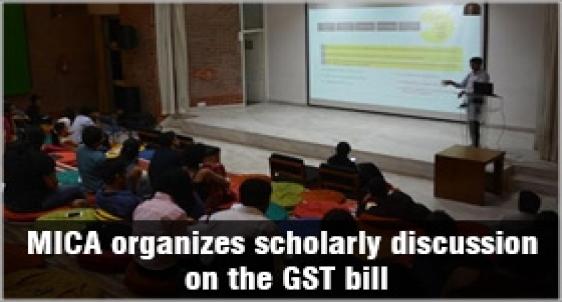
MICA’s student-run Marketing Club, MiCompass, organised a scholarly discussion on the recently passed ‘Goods and Services Bill’ on Tuesday August 16, 2016. The event, ‘The Mobius Strip’, brought together eminent figures from the academia as well as the industry, to discuss the issues and challenges of the GST Bill. Dr. Rasanand Panda, Professor of Economics at MICA represented the academic body, and Mr. Maulin Gaglani, Manager, Indirect Taxes, Ernst and Young, provided the industrial perspective on the matter.
Dr. Panda commenced his address by thanking the dean, and the team, for providing a unique platform for such a pertinent discussion. He divided his deliberation on the subject into three segments – the impact of GST on the GDP of the country, the effect on inflation rate, and the futuristic and political influence of the GST bill.
Providing a purely economic perspective to the debate, Dr. Panda cited that GST is a historical issue for the economists, one that has been ongoing since the economic reforms of 1991. In his opinion, only the basic hurdles to this 25-year-old legacy have been solved this August. Using existing research prevalent in the field, Dr. Panda analysed that the GST will cause the GDP to rise by approximately 1.8-2% and for a trillion-dollar country like India, 2% translates into 40 billion dollars. He asked the audience to ponder if such a huge in pour of money into the GDP in the next 2-3 years can have any negative impact at all. Calling himself an optimist, Dr. Panda highlighted that even if the prices of goods and services do rise in the short run due to the increasingly high demand of services, the effect will neutralise in the long run, and thus should not be a matter of concern for us.
Further, he illustrated how GST “will give the right boost to the manufacturing sector”, and comes in complete tandem with the ‘Make in India’ policy followed by the government. He illustrated the importance of this by presenting the example of China, whose primary source of success is its manufacturing sector.
Dr. Panda concluded by making certain futuristic predictions. He said “GST will not be affected by political affiliations of states. The negotiations will be done by the GST council. The only thing left to be decided is the rate…There is no doubt about the benefit of GST. If there are some negative effects, they will be temporary.”
Mr. Maulin Gaglani took forward the optimistic stance taken by Dr. Panda. He began by explaining the different components of GST in India, and detailed the proposed GST framework of the country comprising of three main components – dual GST, minimisation of exemptions, and integrated GST on interstate suppliers and imports. Thus, he explained, that the GST “broadens the tax base.” “They want to prune down a lot of exemptions. The reason being simple, if you block, say a hospital from using its credits, healthcare becomes more expensive. As a result, the cost gets passed on to the consumer.”, he said.
He moved on to discuss the salient features of the ‘GST network’, through which payments, registrations, and returns, all become electronic, and will be conducted online. ‘Once the vendors feed the data in the system, the system will auto copulate the credit register. If you do not upload that data, if you’re not in the GST network, the credits get lost. It’ll force them to regulate their vendor, thus regulating trade.’ He drove the severity of this change home by reckoning that “It’s going to impact everyone sitting in this room, and not sitting in this room. Your salaries will depend on your vendors not passing on your invoice.”
Thus, he concluded by saying that “the most important impact of GST will be the play between the organised and the unorganised sector.” According to him, the current unorganised sector will either become organised or run out of business in the next few years. Hence, besides increase in investment, the GDP will also increase due to this new contribution of the now organised, unorganised sector.
The floor was subsequently opened for questions from the students, and the speakers addressed and answered various queries regarding the implications of GST on different sectors and states, detailing how FMCG or B to C companies will face GST differently than the financial service and banking sector.
The session ended with the dean, Ms. Preeti Shroff’s vote of thanks to the speakers, who were then graced with a token of appreciation. The Mobius Strip attempts to bring forth different perspectives of a relevant and debated topic, through learned individuals. Last year, MICA’s Mobius Strip hosted a panel discussion on ‘Net Neutrality’.
Related Article
MICA commences new batch for PGDM-C 2015-17; registers greater academic diversity in class rooms
Dr Atish Chattopadhyay, new dean of MICA Ahmedabad: pledges to make MICA a global institution
MICA: After two year hiatus MICA returns to CAT fold
Stay tuned to MBAUniverse.com for more updates on MICA


























